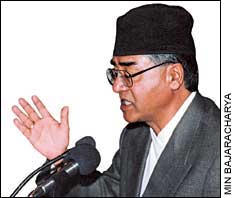 Prime Minister Sher Bahadur Deuba entered the Reporters Without Borders (RSF) hall of press predators the day after we found out Interpol had issued red-corner notices against eight senior Maoist leaders. Our prime minister and premier rebels have become international baddies duly certified by organisations headquartered in France.
Prime Minister Sher Bahadur Deuba entered the Reporters Without Borders (RSF) hall of press predators the day after we found out Interpol had issued red-corner notices against eight senior Maoist leaders. Our prime minister and premier rebels have become international baddies duly certified by organisations headquartered in France. Prachanda and his seven comrades face arrest, at least theoretically, in the 179 member states of the international criminal police organisation. Deuba is in deeper trouble.

The updated RSF roster comes at a time when he's facing the intensifying fury of Nepal's fourth estate. Reporters and editors are outraged not just because a colleague happened to vanish from state custody. Or because many of the more than 100 journalists arrested since the emergency was imposed last November are still behind bars. Their wrath has more to do with what amounts to breach of contract. When the government imposed the emergency, insisting that the restrictions were aimed only at those who encourage and support the rebels, the press believed it and stood squarely behind the prime minister. That was no small risk, considering the prevailing perception that the mainstream press had become the agent of government and elite propaganda.
Self-censorship became a prized editorial skill in deference to the suspension of the people's fundamental rights. To keep the national morale high, questions of immorality were largely ignored. The first stirrings of discontent emerged as private-sector scribes discovered how the emergency turned out to grant their counterparts in the official media the freest moments of their professional lives.
From the official smugness to all those blank editorial columns in the tabloids, carried in protest against state-imposed restrictions, you're forced to wonder whether the prime minister and his men consider the media Public Enemy No. 2 in the anti-Maoist campaign. (Although, it's probably safe to assume that most of our ministers wouldn't have read anything in that space anyway.)
What this internationalisation of Nepal's struggle to preserve press freedom culminates in remains in the domain of news analysts. In two cogent sentences, the RSF has traced Deuba's transformation over the last 12 years. "An unrelenting opponent of the absolute monarchy prior to the start of the 1990s, Deuba has thrown in his lot with those who have opted for all-out war against the Maoists," the RSF says. "To this end, he has decided to renounce all his democratic convictions and has turned Nepal into the world's biggest prison for journalists." The watchdog could have been howling about most of the people in power today.
We can't quibble with the RSF's assertion that press predators come in all shapes and that we must recognise their faces to better denounce them. But two of the other three new carnivores hardly have countenances that can be identified. The Islamic militants on the rampage in Pakistan and Algeria would defy the imagination of the most creative police artist. The security forces in the southern Philippines become more amorphous if you take away their camouflage and jackboots. Then there's the thing that should miff Deuba the most. More than 150 journalists have been attacked or threatened in Bangladesh since October 2001. But the country gets away with Home Minister Altaf Hossain Chowdhury on the list. And there's no state of emergency in force there. The RSF doesn't mention this, but the Maoists' most conspicuous transgression was the three-day abduction of a few journalists for trespass in their western Nepal stronghold last September.
When Deuba complains that the people don't appreciate how he's the only person who has tried both peace and war with the Maoists, he has a point. But the people who are supposed to explain that to the rest of the country are angry with him. And he's not doing anything about that. It's not too late to befriend the press. Here's a tip: We deal with apologies, corrections and retractions all the time but rarely are the recipients.
While we're still in a conciliatory mood, let's face it. The RSF list is not as repulsive as it looks. Consider some of the other people on it: Fidel Castro, Ariel Sharon, Mahathir Mohammad and Vladimir Putin. Have these iron-fisted leaders been that corrosive for their countries? It depends on how, as we like to say, you put together your story.


